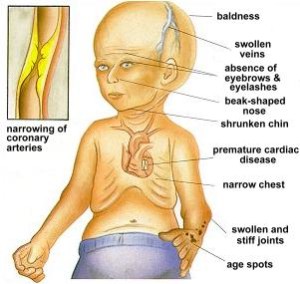Life According to Sam Berns

What would you do if you were told your 2-year-old son has one of the rarest diseases in the world, and that disease has an average life expectancy of only 13 years?
This was the news given to Drs. Leslie Gordon and Scott Berns 13 years ago. Their son Sam was diagnosed with Progeria (sometimes called Hutchinson-Gilford Progeria Syndrome), a rare genetic condition that produces rapid aging in children.
As physicians, his parents immediately searched for whatever they could find about the disorder, but what they found was “an enormous lack of medical information and resources dedicated to Progeria. They recognized that there was no place for these children to go for medical help, no place for parents or doctors to turn for information, and no source of funding for researchers who wanted to do Progeria research.”
 Along with family, friends and colleagues, Drs Gordon and Bern founded the Progeria Research Foundation (PRF), with its mission “to discover treatments and the cure for Progeria and its aging-related disorders”. In a brief 10 years, the foundation has done some amazing research into the cause and of Progeria and have tested the first experimental drug that might prolong the lives of Sam and 28 other children from around the world with the disease (see details below).
Along with family, friends and colleagues, Drs Gordon and Bern founded the Progeria Research Foundation (PRF), with its mission “to discover treatments and the cure for Progeria and its aging-related disorders”. In a brief 10 years, the foundation has done some amazing research into the cause and of Progeria and have tested the first experimental drug that might prolong the lives of Sam and 28 other children from around the world with the disease (see details below).
Sam is now almost 17 years old, and is currently a junior at Foxboro High School in Foxboro MA. He plays the drums in the school marching band. He is an honors student, and hopes to go to MIT for college.
On October 15, Sam and his parents were on Katie Couric’s talk show. Katie had actually met Sam when he was 6 years old when she was the co-host of the Today show. She was so excited to see Sam once again!
Sam’s a big fan of all the Boston sports teams. A couple of weeks ago, he went to see the New England Patriots, and gave them a little “pep talk” before their game against the Atlanta Falcons (which they went on to win). On Katie’s show, Patriot’s team owner, Robert Kraft gave Sam the official “game ball” for that football game. Kraft is a major supporter of the Progeria Research Foundation, and recently pledged to give one-half million dollars to the organization.
Sam is now also a “movie star” of sorts. He and his family are the subject of a HBO Documentary called, Life According to Sam. It was produced by Academy Award and Emmy Award-winning filmmakers Sean Fine and Andrea Nix Fine. They It has won critical praise at several film festivals and now it will premiere on HBO on October 21st. Here is the trailer for the film:
I am very much looking forward to watch what I suspect will be a very inspirational film!
What is Progeria?
Progeria is a rare genetic condition that produces rapid aging in children.
Progeria is a rare condition that is remarkable because its symptoms strongly resemble normal human aging, but occur in young children. It usually is not passed down through families. Rarely is it seen in more than one child in a family.
 The symptoms of progeria include:
The symptoms of progeria include:
- Growth failure during the first year of life
- Narrow, shrunken or wrinkled face
- Baldness
- Loss of eyebrows and eyelashes
- Short stature
- Large head for size of face (macrocephaly)
- Open soft spot (fontanelle)
- Small jaw (micrognathia)
- Dry, scaly, thin skin
- Limited range of motion
- Teeth - delayed or absent formation
Children with progeria suffer from symptoms typically seen in much older people: stiffness of joints, hip dislocations and severe, progressive cardiovascular disease.
Some children with progeria undergo coronary artery bypass surgery and/or angioplasty in attempts to ease the life-threatening cardiovascular complications caused by progressive atherosclerosis. Death occurs on average at age 13, usually from heart attack or stroke.
But there is new hope for those with progeria. Sam’s own mother, Leslie Gordon, co-authored the 2003 paper on the discovery of the gene which causes progeria. Progeria is caused by a tiny mutation in that single gene, known as lamin A (LMNA). The mutation causes the LMNA gene to produce an abnormal form of the lamin A protein, called progerin, which destabilizes the patient’s cells.
Studying this mutation lead researchers at the Progeria Research Foundation to a potential drug treatment for children with Progeria. Farnesyltransferase inhibitors (FTIs), drugs originally developed for cancer, seemed capable of reversing the dramatic cell structure abnormalities.
In September 2012, a research team, headed by Dr. Gordon reported on a 2-½ year drug trial on 28 children with Progeria. The children came from 16 countries and represented 75% of the known Progeria cases worldwide. The children received the FTI drug Lonafarnib. According to PRF:
Every child showing improvement in one or more of four ways: gaining additional weight, better hearing, improved bone structure and/or, most importantly, increased flexibility of blood vessels.
It is this last part- improvement in the flexibility of blood vessels, that may slow the progressive cardiovascular disease from which children with progeria suffer!
It has also been found that the protein progerin is produced in the general population, although for us, it builds up slowly as we age. Researchers can now study whether FTI’s can play a role in the treatment of cardiovascular disease and the aging process in all of us.
For more information about progeria, click here to go to the Resounding Health Casebook on the topic.



























0 comments